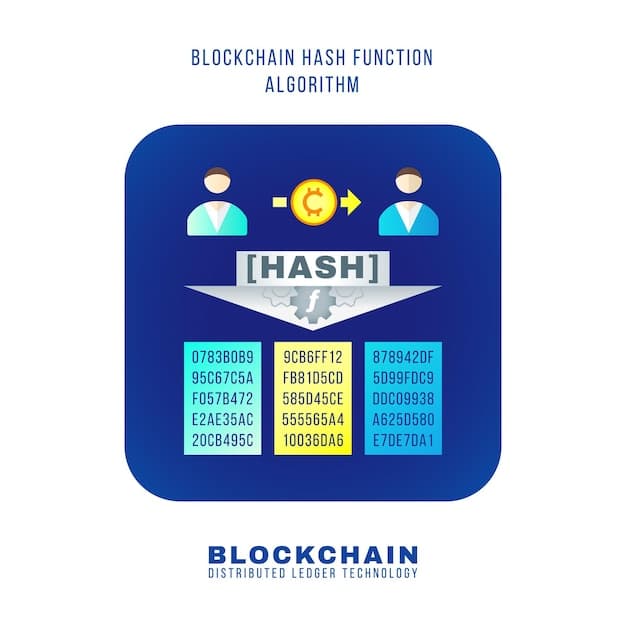Blockchain Data Storage: Decentralized Solutions for US Businesses

Blockchain data storage offers decentralized solutions for US businesses, enhancing security and transparency by distributing data across a network, contrasting with traditional centralized systems prone to single points of failure.
In today’s data-driven landscape, US businesses are constantly seeking more secure and efficient ways to store their valuable information. Blockchain data storage: comparing decentralized storage solutions for US businesses has emerged as a promising alternative to traditional centralized systems, offering enhanced security, transparency, and resilience.
Understanding Blockchain Data Storage for US Businesses
Blockchain technology, initially known for cryptocurrencies, has expanded its applications to various sectors, including data storage. For US businesses, understanding blockchain data storage is crucial for leveraging its benefits.
This technology offers a decentralized approach, distributing data across a network of computers rather than storing it in a single location. This distribution is particularly attractive to businesses concerned about data security and potential breaches.
Centralized vs. Decentralized Storage
Traditional centralized storage relies on a single server or data center. Decentralized storage, on the other hand, distributes data across multiple nodes. Let’s delve deeper into how these two compare.
- Centralized Storage: Managed by a single entity, offering control but also a single point of failure.
- Decentralized Storage: Distributes data across a network, reducing the risk of data loss and enhancing security.
- Cost and Efficiency: Centralized systems can be cheaper initially, but decentralized solutions may offer long-term cost savings due to reduced downtime and enhanced security.

Decentralized storage significantly enhances data security. By distributing data across multiple nodes, the risk of a single point of failure is mitigated.
Benefits of Decentralized Storage for US Companies
For US companies, embracing decentralized storage can bring a host of advantages. Enhanced security and improved data integrity are just a couple of key benefits.
Let’s dive deeper into how these benefits directly translate into operational improvements for your bottom line and give you a competitive edge.
Enhanced Security
Data breaches are a significant concern for businesses. Decentralized storage offers greater security by distributing data across a network, minimizing the impact of potential breaches.
With multiple copies of the data stored across different nodes, recovering from a security incident becomes significantly easier.
Improved Data Integrity
Blockchain’s inherent immutability ensures data integrity. Once data is written to the blockchain, it cannot be altered, providing a reliable audit trail.
This feature is particularly useful for industries requiring strict compliance and transparent record-keeping.
Cost Savings
Although the initial setup might seem complex, decentralized storage can lead to cost savings. Reduced downtime, lower maintenance costs, and eliminating the dependency on large data centers contribute to a more efficient and cost-effective operation.
By removing single points of failure and enhancing security, businesses can also save on data recovery and security incident costs.
Comparing Decentralized Storage Solutions
Several decentralized storage solutions are available for US businesses, each with its unique characteristics. Comparing these solutions helps businesses make informed decisions.
Here, we’ll explore some of the leading platforms, comparing their key features, costs, and suitability for different business needs.
Filecoin
Filecoin is a decentralized storage network that incentivizes storage providers. Users pay to store their files on the network, and storage providers earn FIL tokens for providing storage space.
Filecoin provides a marketplace for storage, allowing businesses to find cost-effective storage solutions, but some may find the token-based system complex.
Storj
Storj is another popular decentralized storage platform. It encrypts and distributes data across a global network of nodes. It emphasizes enterprise-grade security and performance.
Storj offers a user-friendly interface and is designed for businesses looking for a straightforward and reliable storage solution.
Sia
Sia uses smart contracts to create a decentralized storage marketplace. It allows users to rent storage space from providers worldwide.
- Pricing: Often more competitive than traditional cloud storage.
- Customization: Offers a high degree of control over data storage.
- Complexity: May require more technical expertise to set up and manage.

Choosing the right decentralized storage solution depends on your business requirements. Consider factors such as cost, ease of use, security features, and scalability. Conducting a thorough assessment ensures that the selected solution aligns with your operational needs and business goals.
Implementing Blockchain Storage: Key Considerations
Implementing blockchain storage involves several key considerations for US businesses. These range from regulatory compliance to technical feasibility and the integration with existing systems.
Taking these factors into account ensures a smooth transition toward decentralized storage and maximizes the benefits for your organization.
Regulatory Compliance
US businesses must comply with regulations such as GDPR, CCPA, and industry-specific requirements. Ensuring that the chosen blockchain storage solution meets these standards is critical. Conduct thorough compliance checks to avoid potential legal issues.
Data residency requirements, data access rights, and data retention policies are essential components of a compliant storage strategy.
Technical Feasibility
Integrating blockchain storage with existing systems requires careful planning. Ensure that the chosen solution is compatible with your current infrastructure. Consider API integrations and the need for custom development.
Businesses must also evaluate their internal skills to manage and maintain blockchain storage solutions effectively.
Scalability
Consider the scalability of the chosen blockchain storage solution. It should accommodate your business’s growing data storage needs without compromising performance or security.
Evaluate the platform’s ability to handle large volumes of data and increasing user demands to ensure long-term sustainability.
Use Cases for Blockchain Data Storage in the US
Blockchain data storage offers various use cases for US businesses across different industries. Healthcare, finance, and supply chain management are a few examples.
Blockchain data storage can provide enhanced security, transparency, and efficiency across various organizational functions through the unique functionalities offered by the technology.
Healthcare
In healthcare, blockchain storage can secure patient data and ensure compliance with HIPAA. It enables the secure sharing of medical records and facilitates clinical trial data management.
Blockchain’s immutability guarantees data integrity, allowing healthcare providers to maintain accurate and tamper-proof records.
Finance
For the finance industry, blockchain storage enhances transaction security and reduces fraud. It facilitates secure trade finance operations and ensures compliance with financial regulations.
The transparency and auditability provided by blockchain can significantly reduce operational risks and improve regulatory compliance.
Supply Chain Management
Blockchain storage improves traceability and transparency in supply chains. It allows businesses to track products from origin to consumer, ensuring authenticity and preventing counterfeiting.
Enhanced visibility and accountability can significantly reduce operational inefficiencies and improve customer satisfaction.
Future Trends in Blockchain Data Storage
The future of blockchain data storage is promising, with ongoing advancements and increasing adoption among US businesses. Expect more scalable and user-friendly solutions.
Furthermore, emerging technologies such as edge computing and layer-2 scaling solutions are paving the way for even faster, more efficient, and secure data storage options.
Scalability Solutions
Ongoing research is focused on improving the scalability of blockchain storage. Layer-2 scaling solutions and sharding techniques aim to enhance transaction throughput and reduce storage costs.
These advancements will make blockchain storage more viable for businesses dealing with massive data volumes.
Integration with Edge Computing
Edge computing brings data storage closer to the source, reducing latency and improving performance. Integrating edge computing with blockchain storage can enhance the efficiency of data processing and analytics.
This convergence will enable real-time data analysis and decision-making, benefiting industries such as IoT and smart manufacturing.
User-Friendly Interfaces
Future blockchain storage solutions will likely feature more user-friendly interfaces. Simplified deployment, management, and integration processes will drive broader adoption among US businesses.
Intuitive interfaces and automated processes will lower the technical barrier to entry and encourage more widespread use of blockchain storage.
| Key Aspect | Brief Description |
|---|---|
| 🔒 Security | Decentralized storage enhances security by distributing data across multiple nodes. |
| 📈 Cost Savings | Reduces downtime and maintenance costs associated with traditional methods. |
| 🛡️ Data Integrity | Blockchain ensures data immutability, creating a reliable audit trail. |
| 🏢 Use Cases | Healthcare, finance, and supply chain management benefit from enhanced security and transparency. |
Frequently Asked Questions
▼
Blockchain data storage is a decentralized method of storing data across a network of computers, enhancing security and transparency compared to traditional centralized systems.
▼
By distributing data across multiple nodes, blockchain storage reduces the risk of a single point of failure and minimizes the impact of potential data breaches.
▼
Decentralized storage offers enhanced security, improved transparency, better data integrity, potential costs savings, and increased scalability for US companies.
▼
Implementing blockchain storage requires careful planning, consideration for regulatory compliance, assessing technical feasibility, and ensuring integration with existing systems.
▼
Blockchain storage is used in healthcare for securing patient data, in finance for enhancing transaction security, and in supply chain management for improving traceability.
Conclusion
In conclusion, **blockchain data storage: comparing decentralized storage solutions for US businesses** reveals a promising path toward enhanced security, efficiency, and transparency. By understanding its benefits, comparing available solutions, and carefully planning implementation, US businesses can leverage blockchain storage to gain a competitive edge. Embracing decentralized storage solutions now can position businesses for long-term success in an increasingly data-driven world.





